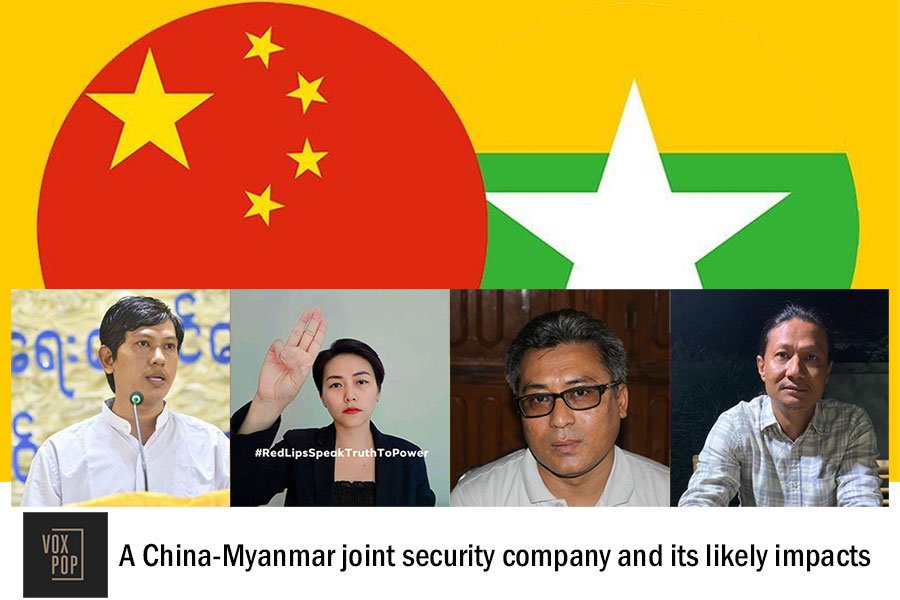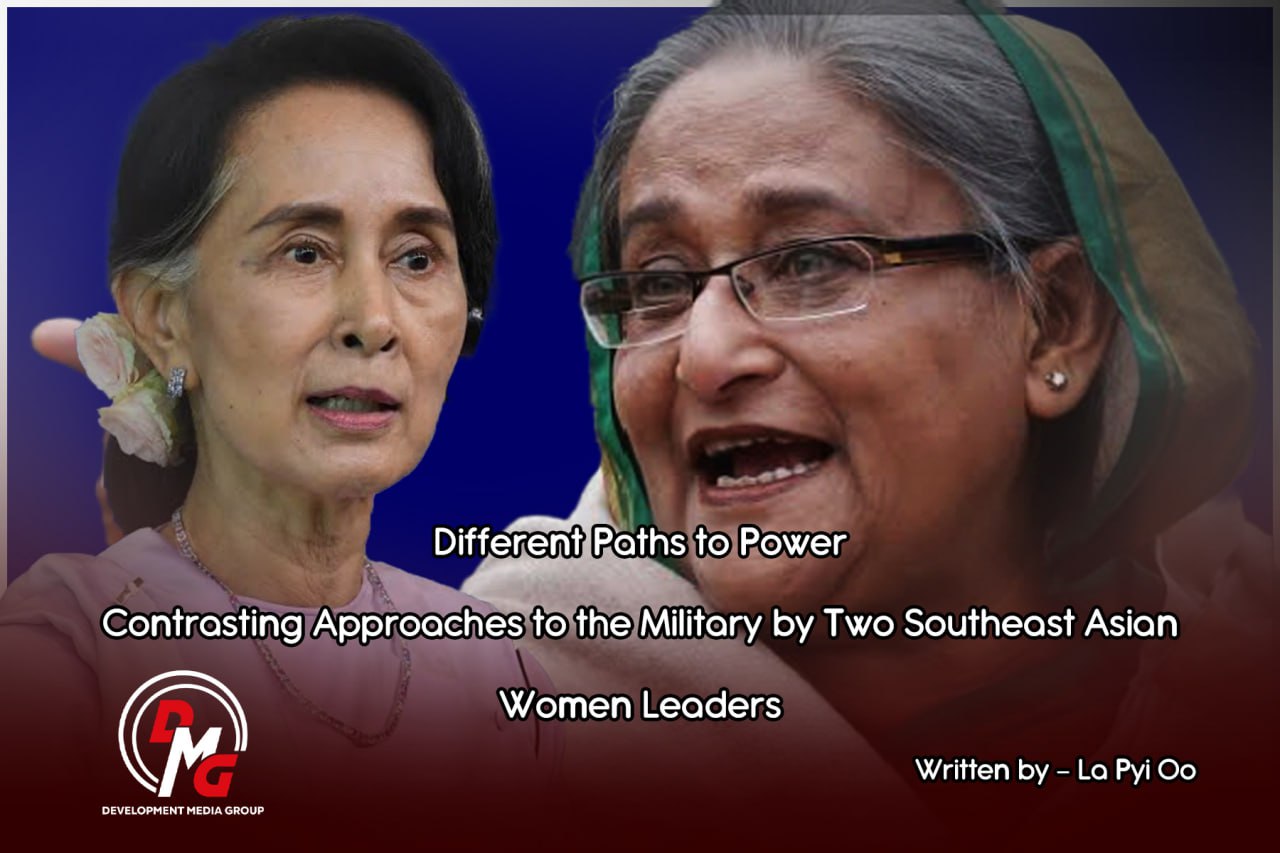- Muslim militiamen flee junta camps in Sittwe amid oppression, discrimination
- Junta navy activities halt fishing in Thandwe
- Junta airstrike kills 21 POWs, family members at Kyauktaw detention centre
- Arakan Army seeks to expand territorial control in Sittwe
- 6-year-old girl raped in Maungdaw; suspect arrested
Vox Pop: A China-Myanmar joint security company and its likely impacts
Junta boss Min Aung Hlaing visited Yunnan Province in November on his first visit to China since the 2021 coup. Following his trip, China proposed the establishment of a joint venture security company between the two countries, and the Myanmar regime announced on December 3 that a working committee had been formed to prepare for the formation of the company.
09 Dec 2024

DMG Newsroom
9 December 2024, Mrauk-U
Junta boss Min Aung Hlaing visited Yunnan Province in November on his first visit to China since the 2021 coup. Following his trip, China proposed the establishment of a joint venture security company between the two countries, and the Myanmar regime announced on December 3 that a working committee had been formed to prepare for the formation of the company.
Concerns have been raised that the proposed security company will allow Chinese troops to enter Myanmar and provide military assistance to the regime, which is currently at war on multiple fronts with anti-junta forces including several ethnic armed groups.
Politicians and activists spoke to DMG about the likely impact of the security company on the popular armed revolt against the regime.
Writer Wai Hun Aung || Former political prisoner
After the junta leader's visit to China, there were reports that China and the Myanmar military would form a joint security company. This has caused concern among politically aware citizens. People have greater concerns as China is already heavily involved in Myanmar's affairs.
Min Aung Hlaing is aware that his military is losing and is looking for a way out. The military's strategy of divide and rule has been quite successful, and they are now trying to get China involved by saying, 'We can no longer protect your interests, so you must protect them yourselves, and we will cooperate and support you.' Min Aung Hlaing went to China to give that message.
China is deeply involved in Myanmar's politics. It has coerced the Ta'ang National Liberation Army (TNLA) and Myanmar National Democratic Alliance Army (MNDAA), and pressured the United Wa State Army. Public concerns are therefore not unreasonable. The public's fears are not unfounded.
The entry of Chinese forces into Myanmar will not stall the Spring Revolution's momentum. Instead, it will only intensify the revolution. The public and armed revolutionary groups will likely resist China even more fiercely.
Ma Thinzar Shunlei Yi || Human rights activist
Regarding China's attempt to deploy private security troops in Myanmar, the immediate thought that came to my mind: 'Why now?' China already influences Myanmar economically, politically, and financially. Both the revolutionary forces and the military regime cannot ignore China's influence. Whether their forces enter or not, China is already pulling the strings.
However, if private security forces establish a presence in Myanmar, we can view it as a more aggressive move.
Revolutionary groups along the Chinese border, including the TNLA and MNDAA, as well as groups across the country, are all aware of the moves the military regime has in mind. Despite China's efforts to mediate, injustices continue to occur. Young people have taken up arms because of the military's disregard for democratic principles and human rights.
The TNLA and MNDAA may meet the regime due to Chinese pressure, but I do not think they will trust any promises made by the regime. They will focus on what they can do politically.
If pressured, they may come to the negotiating table, but the extent to which these discussions promote justice and political momentum will depend on the decisions of those groups.
U Aung Marm Oo || Editor-in-Chief & Executive Director || Development Media Group (DMG)
Though China claims that the security company intends to protect their projects in Myanmar, it may provide technical assistance and weapons to the Myanmar military later, which could cause obstacles to the revolution in Arakan.
Fighting may de-escalate in northern Shan State due to China's pressure on the TNLA and MNDAA. However, fighting will continue as usual in Mandalay and Sagaing regions in central Myanmar, and other parts of the country. The TNLA and MNDAA have proposed talks not because they don't want to continue to fight, but because of pressure from China. But I think they will find various means to support the People's Defence Forces (PDFs) and other allies. They may have strategies for how to cope with China's pressure, and continue to fight the military dictatorship.
China has expressed support for the regime because of its interests and projects in Myanmar, but no dictator has been accepted on the international stage. China may exercise restraint in the future.
If the PDFs and revolutionary groups gain strength, China may support them. The power is balanced at present. But in the next two or three months, China and India might change their stance. As revolutionary groups continue to capture more territory, they will become stronger. While China may mediate talks, any breakthrough is unlikely. It will, however, cause obstacles and challenges to the revolution.
Ko Moe Htet Naing || Political and research advisor || Nyan Lynn Thit Analytica
One aspect to consider is the military capabilities of the security company, what kind of weapons it will possess, and where the troops will be stationed. Based on that information, we may consider whether it can affect Myanmar's revolution.
My general assumption is that it will focus on protecting joint venture projects with China, oil and gas projects and ongoing projects. For example, if they protect critical areas along the oil pipeline to the Chinese border, it would be a grave problem. Those places are where revolutionary groups are present. The security company can't provide direct military support to the military regime.
However, their presence could make it difficult to conduct operations in these areas. Revolutionary groups have to be careful to avoid the sites of Chinese interests such as oil and gas pipelines or cement plants, considering the need to maintain friendly ties with neighbours.
If the security company deploys guards in critical areas along the pipelines, it will enable the regime to use them as cover for transporting weapons and supplies as well as reinforcements. Revolutionary groups have to avoid armed confrontation with the security company troops and cannot risk wrongly firing on them.
The regime will take advantage of this and force the revolutionary groups to halt their offensive. Revolutionary groups must closely monitor the progress of the proposed joint security company, their activities and where their troops will be deployed.





.jpg)














